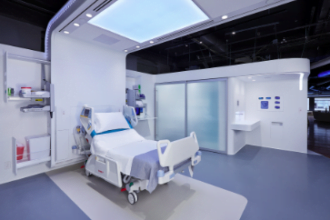First question: prevention of what? The evidence for daily 81 mg of aspirin (baby aspirin) for prevention of cardiovascular disease is pretty solid. Furthermore, we know that increasing the dose does not confer additional cardiovascular benefits.
First question: prevention of what? The evidence for daily 81 mg of aspirin (baby aspirin) for prevention of cardiovascular disease is pretty solid. Furthermore, we know that increasing the dose does not confer additional cardiovascular benefits.
 But aspirin has also been shown to prevent adenomatous polyps and colon cancer. Two pivotal studies form the basis of our knowledge on colon cancer prevention. The Nurses’ Health Study (NHS) looked at individuals who took 2 or more 325 mg tablets (adult aspirin) a day. The study showed a 23% reduction in subsequent colorectal cancer when 2 tablets a day were taken. These results gained even more credibility because there was an association between dose and response; individuals in the highest quartile, those who took more than 2 tablets a day, had a 42% relative risk reduction. Another study, the Health Professional follow-up study, showed similar reduction in colorectal cancer risk. Together the 2 trials included almost 200,000 individuals over several decades. Pretty impressive, except that these trials were observational, uncontrolled, non-randomized, in short: susceptible to errors due to unaccounted confounding factors. This issue became moot when a randomized trial, the British Doctors Aspirin Trial, followed more than 7500 individuals for at least 20 years. The results were convincing: regular use of aspirin of at least 325 mg/d resulted in a 29% reduction in colorectal cancer risk.
But aspirin has also been shown to prevent adenomatous polyps and colon cancer. Two pivotal studies form the basis of our knowledge on colon cancer prevention. The Nurses’ Health Study (NHS) looked at individuals who took 2 or more 325 mg tablets (adult aspirin) a day. The study showed a 23% reduction in subsequent colorectal cancer when 2 tablets a day were taken. These results gained even more credibility because there was an association between dose and response; individuals in the highest quartile, those who took more than 2 tablets a day, had a 42% relative risk reduction. Another study, the Health Professional follow-up study, showed similar reduction in colorectal cancer risk. Together the 2 trials included almost 200,000 individuals over several decades. Pretty impressive, except that these trials were observational, uncontrolled, non-randomized, in short: susceptible to errors due to unaccounted confounding factors. This issue became moot when a randomized trial, the British Doctors Aspirin Trial, followed more than 7500 individuals for at least 20 years. The results were convincing: regular use of aspirin of at least 325 mg/d resulted in a 29% reduction in colorectal cancer risk.
So, should we start taking daily adult aspirin and, since a dose/response relationship was demonstrated, the more the merrier? Consider the adverse effects of aspirin: GI bleed, ulcer, reduced blood coagulation that can lead to hemorrhagic stroke. Does the benefit of reduced polyp and colorectal cancer risk outweigh these risks? The answer is most likely not. We need to know more before we embark on such a massive public health prevention program. For instance, is everybody equally protected by taking aspirin? What if it works only in some people but not at all in others? We are going to expose these people to unnecessary risks, and no benefit.
When in doubt, try science
How does aspirin work? By inhibiting the enzymes COX 1 and 2. This enzymes are pivotal in the metabolism of prostaglandins, chemicals that mediate inflammation. Studies have shown that local inflammation at the site of the polyp or tumor promotes the growth of the cancer. So it stands to reason that inhibition of the COX enzymes would reduce the growth of the tumor. Indeed, large trials of COX- 2 inhibitors, like rofecoxib (Vioxx, no longer on the market) and celecoxib (Celebrex) demonstrated a 24%-45% reduction of recurrence after polypectomy. But these are overall results. The study did not tell us what differentiated the responders from the non-responders. So what we need are good markers to tell us who is likely to benefit, and who is not.
There is initial progress in finding those markers. For example, people with the UGT1A6 genetic variant have impaired aspirin metabolism. So when they take aspirin their blood levels of the drug are much higher than people who have the “wild type” of the gene. People with the variant had a 34% reduction in the risk of adenoma even without aspirin, and a 39% reduction if they took 1 or more aspirin tablets a day. What about the “wild type”, who make up the majority of the population? They showed no benefit in taking aspirin.
Doing genetic analysis on everybody as a screen for prevention is going to be prohibitively expensive. But another study showed that persons with the highest quartiles of circulating inflammatory factors had a 67% greater likelihood of developing colorectal cancer, and they showed a 60% reduction in colorectal cancer if they took aspirin. Those in the lower quartiles of circulating inflammatory factors derived no benefit from taking aspirin. These results are truly impressive; once the test is developed for commercial use it would be a more selective, and much smarter, approach to deciding who is a candidate for aspirin treatment.
The U.S. Preventive Services Task Force has recommended against the general use of NSAID for colorectal cancer prevention, because the potential for harm outweighs the potential for benefit in the general population. I agree. Colonoscopy has an excellent track record in detecting adenomatous polyps and colorectal cancer. The Preventive task force recommends having colonoscopy done every 10 years, starting at age 50, until age 75. The latter age is a bit controversial, and some recommend continuing colonoscopy to age 80. If you are at a higher risk (such as having a first degree relative who had colorectal cancer) the recommendation is to start colonoscopy at age 40.
The odds are that for the majority of individuals aspirin can cause more harm than good. The wiser course is to do nothing, and wait until science defines with more precision who would benefit and who could be harmed.
image:pharma/shutterstock
The post The evolving story of aspirin for prevention appeared first on The Doctor Weighs In.






-330x220.jpg)

